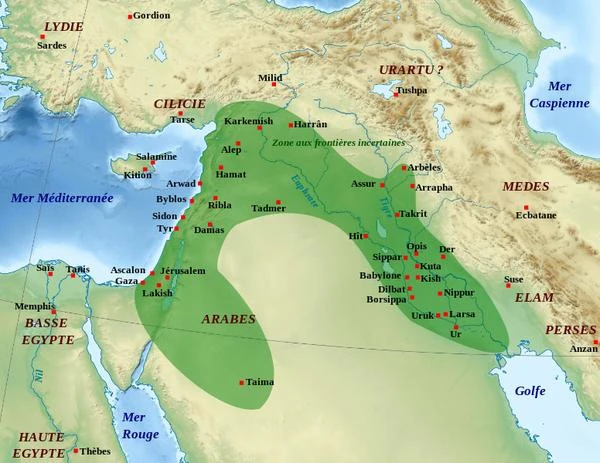
Image description: Babylonia (Southern Iraq). The Babylonian civilization flourished in Southern Mesopotamia. It lasted from the beginning of the 2nd millennium BCE until the beginning of our era. It emerged from the older civilizations of Mesopotamia (Sumer and Akkad).
Babylonian Astronomy, practiced from the second millennium BCE, is one of the earliest forms of structured "science." It is based on the meticulous observation of celestial bodies, particularly planets and stars, with a complex calendar based on lunar and solar cycles. The Babylonians introduced key concepts that influenced astronomy in subsequent civilizations, such as the idea of the precession of the equinoxes, as well as mathematical models to predict the movements of celestial bodies. This vast culture has been passed down to us through thousands of Clay Tablets inscribed with a stylus (a small part concerns astronomy).
Historians of science consider that Mesopotamian astronomy was not a science, due to the predominant role of astrology. However, astrology and astronomy in Mesopotamia are part of the same domain of thought, the same form of celestial knowledge or "Astral Science".
The oldest data we know come from the Babylonians who lived in Mesopotamia 4000 years ago. The phenomena measured in priority were the risings and settings of the stars (first and last visibilities in the sky). But also the synodic periods (duration to return to the same celestial configuration). Among the many regular celestial phenomena of astronomy, we find lunar and solar eclipses, lunar phase changes, the periods of Mercury, Venus, Mars, Jupiter, Saturn, the inclination of the Earth's orbit, the oppositions and conjunctions of the planets. The distribution of stars in the sky and the movements of the wandering stars (synodic period) were known in the first half of the 1st millennium BCE.
From the 5th century BCE, the ecliptic is divided into 12 sections of 30 degrees containing the 12 constellations approximately corresponding to our current zodiac signs. The Zodiac was a reference system in the Almanacs (calendars listing major dates), the Horoscopes (examination of the hour of birth in relation to celestial events) and the Ephemerides (astronomical tables by which the positions of the planets are determined for each day).
"In the year 243, in the month of Nisannu, on the 20th day (April 16, 69 BCE), during the 9th hour, a child was born. At this hour, the Moon was at the end of Capricorn at 18°, the Sun at the end of Aries at 30°, Jupiter in Sagittarius at 24°, Venus in Gemini at 13°, Saturn in Aquarius at 15°, Mars in Libra at 14°, Mercury had not risen and was not visible. The setting of the Moon before the rising of the Sun occurred on the 14th day, the last lunar visibility occurred on the 27th day.
That year, on the 28th day of the month Abu (August 20, 69 BCE), an expected solar eclipse was not observed at the end of Leo. On the 13th day of the month Ululu (September 3, 69 BCE) at sunset, a lunar eclipse exceeding one-third of the disk occurred; the Moon was already eclipsed when it rose in Pisces.
Among the major discoveries of the Babylonians, we find the elaboration of the first Astronomical Tables, such as the famous Tablets of Enuma Anu Enlil, which consisted of series of observations and predictions related to eclipses and the positions of the planets. These tables served as a reference for astronomers of later cultures.
The Babylonian theory of the Precession of the Equinoxes, according to which the positions of the stars change slowly over time due to the movement of the Earth's axis, is a fundamental concept in astronomy.
Regular observations and empirical measurement of the cycles of the Moon and the Sun were essential for the determination of calendars, although these already had a long history. The so-called "Luni-Solar" system had a year of 12 months (lunar cycle). This allowed predicting when it would reappear in the sky. In this context, the month is 29 or 30 days (on average the synodic month is about 29 and a half days).
At the end of the 4th millennium BCE, the month lasted 30 days and the year lasted 12 months. This simplified reference was used to perform calculations. Then it was adjusted according to the actual observed duration of the year. Since the 3rd millennium BCE, to correct the discrepancy between the calculation and the observation, an intercalary month was added empirically.
Babylonian astrology and astronomy were the origin of Greek, Byzantine, Syrian, medieval Muslim, and European astronomy. Classical Greek and Latin sources frequently refer to the astronomers of Mesopotamia as "Chaldeans", often presenting them as specialists in astrology and other forms of divination.